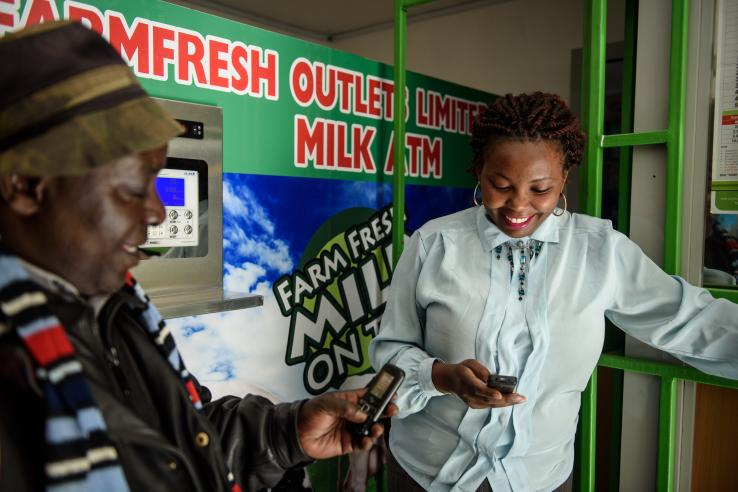
Debating Ideas is a new section that aims to reflect the values and editorial ethos of the African Arguments book series, publishing engaged, often radical, scholarship, original and activist writing from within the African continent and beyond. It will offer debates and engagements, contexts and controversies, and reviews and responses flowing from the African Arguments books.

Credit: Intersect
As of December 2020, approximately two-thirds of total global mobile money transactions were driven by users in sub-Saharan Africa (SSA), with a transaction value of 490 billion USD. The region recorded roughly 548 million registered mobile money accounts in 2020, with 159 million of these registrations identified as active accounts. Mobile money has been touted as a revolutionary tool for expanding access to financial services in low resource environments. With just a mobile phone, users are able to quickly transfer money at low cost and, typically, without needing access to an existing banking account.
What is mobile money?
Mobile money is a digital payment platform that allows for the transfer of money between cellphone devices. The technology is installed in the SIM card of the device and can be used on regular and smartphone devices. Users can receive, withdraw, and send money without being connected to the formal banking system. The product differs from mobile banking where users connect using internet-enabled mobile devices to manage the funds in their bank account.
Low resource settings—where families and friends financially support each other, even when geographically distant—are particularly well-placed to realize the benefits of this technology. The amount remitted by migrants from sub-Saharan Africa reached US$48 billion in 2018. In Nigeria, remittances reached US$25 billion in 2018—almost four times more than foreign direct investment and official development assistance combined. In Lesotho, remittances amounted to 16 percent of the country’s gross domestic product. Prior to Kenya’s recent growth in mobile money services, household members had to find creative ways to send money to loved ones who lived across the country. These informal processes—such as sending physical cash with friends or bus drivers—were very expensive, caused delays, and created uncertainty that the money would reach the anticipated destination both from a logistical and security perspective. Mobile money offered a solution with direct person-to-person transfers.
But does this technology live up to its promises? What are the impacts on the households who use mobile money?
Can mobile money can generate financial resilience?
A growing body of research is emerging with a consistent finding: households are able to better respond to unforeseen difficulties when they have access to mobile money. When an unexpected negative event—such as a flood or a child falling ill—occurs, households with mobile money are able to rely on the easy and affordable transfer of money from family and friends even if they are living far away.
In Kenya, a study that uses a difference-in-difference technique has shown that the impact of mobile money on a household’s resilience can be sizable. Households who had access to M-PESA (Kenya’s mobile money platform) during a negative event—such as unexpected extreme weather or illness in the family—were better able to respond and did not have to reduce their spending on food and related goods in response to the event. This is because mobile money helps risk-sharing among the community or family irrespective of location, strengthening these informal insurance networks.
In related work that also uses a difference-in-difference methodology, researchers looked at the effects of a health shock and found households who used M-PESA were able to spend more on health-related expenses while keeping up with other household payments. Households who didn’t use M-PESA financed their health-related expenses by cutting down on non-food expenses, including withdrawing their children from school. Similar results have been found in other contexts using randomized control trials in Mozambique and Uganda, as well as in Tanzania and Bangladesh where difference-in-difference and instrumental variable estimation strategies were used respectively.
Higher savings for households
Mobile money can also be helpful for financial resilience as it facilitates saving. In Kenya, mobile money accounts for women were used to easily (and securely) allocate and label money for savings. The researchers found that labelling an account, such as encouraging women to use the account for emergency expenses and savings, along with a one-on-one activity eliciting savings goals and weekly SMS reminders on the savings goals especially increased the amount saved. This amount accrued helped women respond to unplanned expenses and made them less reliant on existing networks for support.
Also in Kenya, researchers used instrumental variables to find that mobile money use led households to save more. Households with mobile money accounts were 16–22 percent more likely to save and their average household savings increased by 15–21 percent, the equivalent of US$2.7 to US$3.7 per month.
Transparency and a more formal economy through mobile money?
Mobile money electronically records all transactions, which improves the security of payments as well as their transparency, the consequences of which could be far-reaching on the economy. Greater transparency of earnings, transactions, and remittances could greatly improve tax collection. A mature mobile money system could also foster formalization of the economy, integrating informal sector users into formal banking and insurance, and allowing for stronger links to the government through social protection schemes, tax collection, and other government programs.
Long-term effects on occupation decisions
Mobile money and the ability to easily and safely receive money from social networks at a distance has been found to change the way that individuals within households make decisions around their occupation. In Kenya, researchers used a difference-in-difference methodology to examine the long-run effects of M-PESA usage and found that higher access to mobile money changed occupation choices, especially among women. The study estimated that approximately 185,000 women moved from agriculture to small-scale retail as a result of access to M-PESA.
Similarly, access to mobile money led to a shift from farm-based work to self-employment in Uganda and migration from rural to urban areas where the income is higher in Mozambique. The latter was because mobile money increased individuals’ trust that they could easily and safely remit money to their families in the rural areas.
Long-term effects on poverty and women
Non-RCT research from Kenya found that access to mobile money increased per capita household consumption and savings, and therefore reduced the rate of poverty. This increased consumption translated to a movement of 196,000 households out of extreme poverty—equivalent to 2 percent of all households in Kenya. Long-term effects are examined in this study by running a follow-up survey in 2014 for households that saw relatively large increases in agent access between 2008 and 2010. The effects were largest in female-headed households, which highlights how impact can be amplified when technology is given to female household leaders. The researchers posit that mobile money could give women in male-headed households, who are also usually secondary income earners, more financial independence. Agent density—the number of agents operating in a specific area—played a key role. Increased agent density was linked to 3 percent of women in both female- and male-headed households taking up business or retail occupations over-farming.
Not a silver bullet
As described above, the long-run effects of mobile money on poverty reduction, and the consistent cross-context findings of its ability to mitigate the effects of negative events, are impressive. However, there are a number of pre-conditions required for these impacts to be achieved. These factors include:
- developing a strong profitable network of agents to deliver the mobile money system, including cash-out services;
- making the registration/use of the technology simple and trouble-free for the consumer;
- investing in infrastructure to scale from the start; and
- creating a strong regulatory environment once the technology has been developed.
At a more fundamental level, individuals must have access to mobile devices and they must understand how to use the mobile money product. For example, in the roll-out of mobile money in Mozambique, information was disseminated to individuals and agents in an intense mobilization process. This is seen as an important part of the success of the program implementation.
With all the promise that mobile money holds, it is not without its challenges and risks.
- Infrastructure challenges: Mobile money requires telecom infrastructure which can require significant up-front investment. A lack of broadband infrastructure on the continent—25 percent coverage as of 2018—means there will be limited integration with other digital financial products. Mobile money is often reliant on SMS-based technology which makes it difficult to link mobile money with internet-based digital financial products.
- Operational risks: Evidence also suggests that mobile money opens avenues for fraud. Research shows many mobile money companies are vulnerable to data breaches due to improperly encrypted communications, potentially allowing an attacker to steal money.
- Regulatory challenges: Finally, many policymakers and private sector companies still struggle with how to regulate mobile money to protect against these operational risks, encourage its use, and build a network of agents. There are also unanswered questions around how to design mobile money platforms and networks, link these to digital identification systems, and leverage the spread of mobile money to create stronger financial markets.
Open questions
So far, the use of mobile money has been concentrated in the person-to-person (P2P) payments space as well as in certain regions/countries. Person-to-business payments, business-to-business, and government-to-business payments are rarely transferred through mobile money. In addition, even for countries with a high mobile money penetration in the P2P space, there is limited evidence on whether it has transformed financial markets or the use of physical cash.
Although there has been significant work on the impacts of mobile money on households, and some work on the impacts on micro enterprises, questions remain around how to increase the take-up of mobile money in countries with low penetration. The possible benefits for governments to use mobile money for person-to-government (P2G) payments, for example, as a tool for tax collection, also remains largely unexplored. While there is a large potential to use mobile money for P2G payments, this still needs to be rigorously explored. You can read more about this and many more unexplored policy and research questions in the Digital Identification and Finance Initiative’s (DigiFI)’s framing paper.
*This piece has been reposted from the JPAL site as part of an ongoing joint series.






